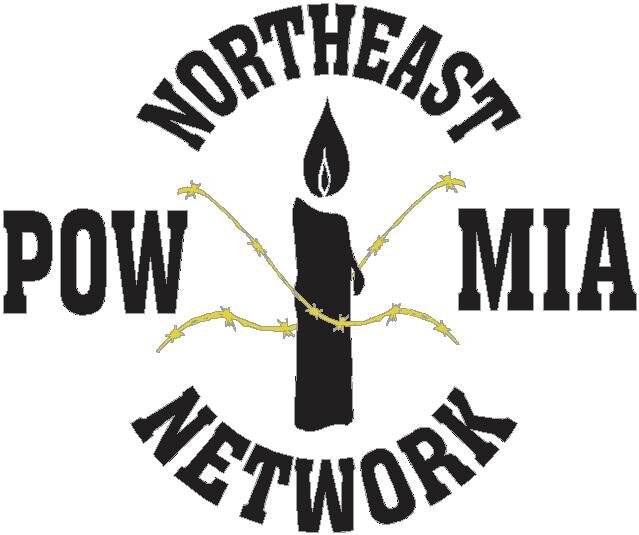
Northeast POW/MIA Network
President’s Page
Faith, Trust, Responsibility and Accountability.....
We must never Forget
People think courage is the absence of fear”.
“But courage is the presence of faith.”
Former POW Eugene "Red" McDaniel
POW classification questioned - What has changed?
Published Sept. 14, 2005
BEA LEWIS Northern Lakes Region Bureau
MEREDITH — A local veterans' activist is among those pushing federal lawmakers to support a resolution requiring the Department of Defense to reinstate the "POW" or Prisoner of War terminology into the classification of military personnel.
Bob Jones, a former Navy Corpsman who served with the Marines in Vietnam and received a Purple Heart for wounds received in action, is urging both New Hampshire's federal delegation and state lawmakers to support the switch.
"One was understood by all, the other by none," Jones said of the former POW military classification and the new term, "Missing/Captured".
A physician's assistant who believes U.S. servicemen were abandoned in Southeast Asia following the 1973 signing of the Paris Peace Accords by the Nixon Administration, Jones says the new term dramatically reduces the impact of reports and alters the response to such incidents.
Jones spearheaded efforts to make Meredith's Hesky Park home to a weekly Thursday night vigil to raise public awareness about the POW/MIA issue. The 7 p.m. gathering, which attracts both veterans and their supporters, now claims to be the longest-running such vigil in the country.
The group's goal is to focus attention on finding out about the fate of POW/ MIAs from World War II and the Korean and Vietnam conflicts.
"All the flags and yellow ribbons in the world won't bring the truth unless we go get it," said Jones.
He argues that the nature of war has changed markedly and permanently, and as a result, the POW status should be reinstated to "provide maximum protection for all we send into harm's way."
Once the New Hampshire Legislature elects new senate leadership, Jones said he will ask that both the House and the Upper Chamber endorse a resolution that will be forwarded to New Hampshire's federal representatives, asking for the POW classification to be restored. If the Legislature supports the measure, New Hampshire would be the first state in the nation to adopt it.
Jones maintains that similar legislation will be introduced in five other states.
Michael Speicher, of Jacksonville, Fla., was a Navy Commander assigned to the USS Saratoga. During the first Persian Gulf War, Desert Storm, Speicher's F/A-18 Hornet was hit by a surface-to-air missile and crashed on Jan. 17, 1991. Initial reports by U.S. Defense Secretary Dick Cheney stated that Speicher had been killed. One military source said reports indicated that the aircraft had "exploded to bits" in the sky, apparently having suffered a direct hit, but Iraqi officials soon announced the capture of American pilots.
The chances of Speicher's ejection were slim, but he became the first American in Desert Storm to be listed as Missing in Action but, apparently, no one ever went looking for Speicher. Gen. Norman Schwarzkopf had put Army Col. Jesse Johnson in charge of combat search-and- rescue efforts for allied forces opposing Iraq, and Johnson set up strict guidelines for launching a search. The teams would have to hear from a downed pilot, find out his location and assess the risk before going into Iraq.
During the Vietnam Conflict, Jones said, teams would head out and search when they heard that a pilot had gone down. Seventy-one search-and-rescue team members were killed, but Air Force rescuers saved more than 4,000 Americans, and the Navy picked up hundreds of other downed airmen.
In the Persian Gulf War, 35 allied jets went down, but Johnson launched search teams for only seven of them. They rescued three pilots. Speicher's disappearance reportedly did not meet Johnson's requirements.
In the first days of March 1991, the Iraqis released 21 American POWs. Speicher was not among them.
In July, U.S. Senator Bill Nelson, who represents Speicher's home state, urged a new Navy review of efforts to determine Speicher's fate and recommended that the U.S. government undertake an intensified search in Iraq and that the pilot's status be affirmed as "Missing/ Captured."
The Navy has changed its position on Speicher's status over the years, Jones said. Hours after his plane went down, the Pentagon declared him killed in action. Ten years later, the Navy changed his status to missing in action, citing an absence of evidence that he had died.
In October 2002, the Navy switched his status to "Missing/Captured," although it has never released what evidence it has proving he was captured. "Over the years we've learned a great deal, but I am not satisfied we have fulfilled our responsibility to Capt. Speicher or to his family, or to all members of our military," Senator Nelson (D-Florida) wrote in his letter.
A Pentagon team assigned to search for evidence of Speicher after the fall of Baghdad finished its work in May 2004. In testimony before Congress shortly after, Marine Brig. Gen. Joseph McMenamin, who directed the team, indicated that all in-country leads regarding the airman's fate had been exhausted.
The official also said, however, that some leads could not be fully followed as a result of the security threat from the Iraqi insurgency. Also, McMenamin testified that nomadic Bedouin tribesman who might have information about Speicher's fate were both difficult to find and feared retribution by members of Saddam's regime.
Speicher's headstone lies in Arlington National Cemetery, though the government now concedes that it does not know what happened to him. Jones argues that the Department of Defense has used the POW terminology to describe the status of military personnel and for reporting purposes. The military has a sacred bond to attempt to recover any military personnel, whether killed or captured, and changing that status weakens that trust, maintains Jones.
After the return of the 591 POWs, 2,583 Americans remained unaccounted for in Vietnam. Identified remains of 447 Americans have been returned from Vietnam (331), Laos (109), Cambodia (5), and China (2) since the conflict ended on Jan. 27, 1973.
Only one U.S. military member has returned alive from Vietnam since the end of the conflict was declared. Marine Corps PFC Robert Garwood was first listed as a POW by U.S. authorities — but never by the Vietnamese — in 1965 and returned voluntarily to the U.S. in 1979. He was convicted of collaboration with the enemy, but his sentence included no prison term.
POW Flag History
Today the black and white POW/MIA Flag, with its silhouette of a bowed head, set against a guard tower and a single strand of barbed wire serves a national symbol and a challenge to a country not to forget. The story of its origin starts over 30 years ago.
Northeast POW/MIA Network Past Accomplishments
Faith, Trust, Responsibility and Accountability.....
We must never Forget
POW Medal
The Prisoner of War Medal is authorized by Public Law 99-145, 10 USC 1128, as amended by, 10 USC 1128, 1989. It is authorized for any person who, while serving in any capacity with the U.S. Armed Forces, was taken prisoner and held captive after 5 April 1917.




